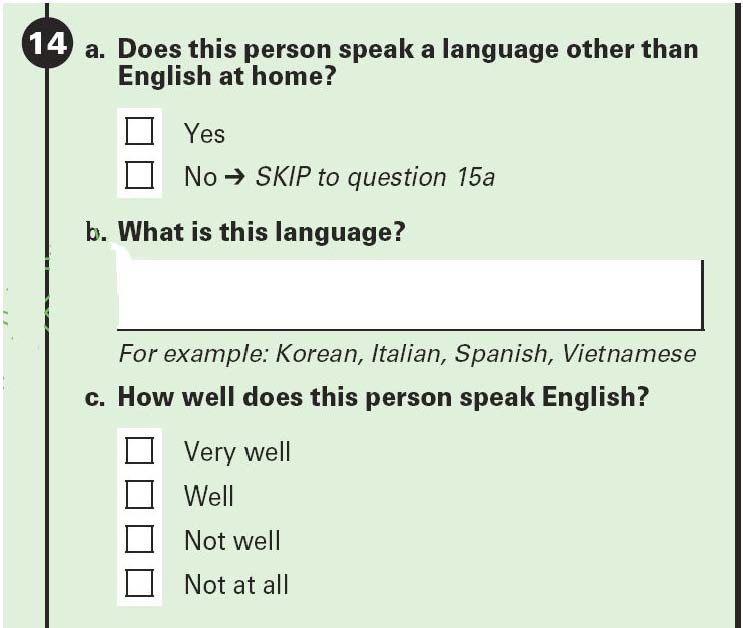Gota a gota, el mar se agota: The Census and Combatting Linguistic Intolerance
Last week, after years of urging, the Census Bureau released this statement:
In response to concerns expressed by data user groups, the Census Bureau decided to eliminate the term “linguistic isolation” for data products issued starting in 2011. We have changed the terminology to one that we feel is more descriptive and less stigmatizing. The phrase that will appear in all new products will be “Households in which no one 14 and over speaks English only or speaks a language other than English at home and Speaks English ‘Very Well.’” (April 18, 2011 email from David S. Johnson, Chief, Housing and Household Economic Statistics Division of the U.S. Census Bureau)
Why is this an important victory? Here’s the background: In the extensive media coverage of the 2010 US Census, language has not been mentioned because it is not one of the ten questions on the new short form, but the Census Bureau’s annual American Community Survey (ACS) includes these three questions:
Based on the data collected in 2009, it was estimated that 80% of the United States population spoke only English at home, and that of the 20% who spoke another language at home, 55% also spoke English “Very Well.” But these percentages obscure the true picture of English proficiency among those who speak another language at home, 62% of whom are Spanish speakers.
The official reports of these statistics help promote linguistic intolerance and racial/ethnic violence by suggesting that newcomers are not learning English. A more accurate portrait would add those who speak English “Well” (20%) to those who speak it “Very Well’ (55%), for a total of 75% (not including those who speak only English at home). Among those who speak Spanish at home, adding the 18% who speak English “Well” to the 53% who speak it “Very Well” produces a total of 71% of proficient English speakers.
Most damaging, however, is the Census Bureau’s classification of “individuals and families” as “linguistically isolated . . . if their household is one in which no member 14 years old and over: (1) speaks only English; or (2) speaks a non-English language and speaks English “very well.”
The Bureau began labeling those who spoke English “Well”, “Not Well” or “Not at All” as “linguistically isolated” in 1990. This was just as Latino and Asian immigrants were changing the complexion of the immigrant flow in the US. It was also a time of a widespread movement to make English the only official language of the USA, prompting an attempt to amend the Constitution (similar legislation is still pending). As of November 2010, 31 states have passed English-only laws.
I was able to encourage several national organizations, including the American Anthropology Association, the American Association for Applied Linguistics, and the Conference on College Composition and Communication, as well as the Census Advisory Committee on the Hispanic Population, chaired by Angelo Falcón, to adopt resolutions against the use of “linguistically isolated.” I did so and they agreed because the term is inaccurate, prejudicial and foments linguistic intolerance. Laura Graham and other members of the Task Force on Language and Social Justice of the American Anthropology Association were instrumental in helping explain why the term is inaccurate, prejudicial, and foments linguistic intolerance.
It is impossible to be “linguistically isolated” unless you live without human contact. Also, under the Census Bureau’s old term many children under 14 who often speak only English are unfairly labeled as “isolated.” Note that all those households where only English is spoken are not considered “linguistically isolated”; only speakers of other languages are demeaned/disparaged in this way.
While we welcome the Census Bureau’s decision to eliminate the use of the term “linguistic isolation,” their replacement for it is a cumbersome description that is difficult to understand (“Households in which no one 14 and over speaks English only or speaks a language other than English at home and Speaks English ‘Very Well’”). In our view, “Emerging Bilingual Households” is more positive than another alternative, “Limited English-Speaking Households,” but we welcome other suggestions.
We continue to lobby for more changes that promote social justice regarding language. Those include the addition of a census question about the ability to speak languages other than English, the rejection of “illegal aliens” as a descriptor for undocumented immigrants, the dissemination of accurate data concerning successful bilingual programs, and the end of linguistic profiling on the job, in housing, and in education. Public support is encouraged. Estamos a las órdenes.
An earlier version of this Guest Commentary appeared in the April 22, 2010 SLA Blog of the Society for Linguistic Anthropology.







